BOOK I. HE Ŏ URH
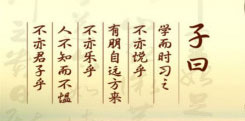

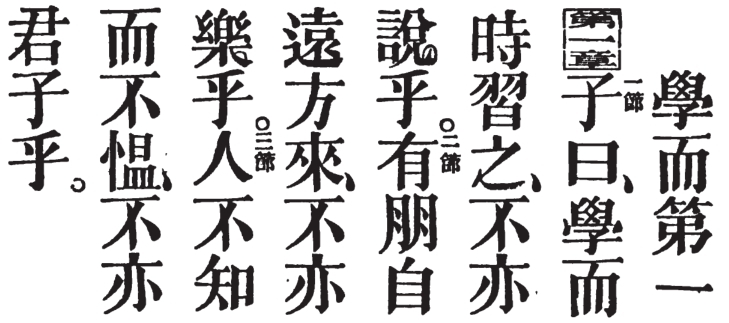
CHAPTER 1
1. The Master said, "Is it not pleasant to learn with a constant perseverance and application?"
2. "Is it not pleasant to have friends coming from distant quarters?"
3. "Is he not a man of complete virtue, who feels no discomposure though men may take no note of him?"

TITLE OF THE WORK —论语 , 'Discourses and Dialogues;' that is, the discourses or discussions of Confucius with his disciples and others on various topics, and his replies to their inquiries. Many chapters, however, and one whole book, are the sayings, not of the sage himself, but of some of his disciples. The characters may also be rendered 'Digested Conversations,' and this appears to be the more ancient signification attached to them, the account being, that, after the death of Confucius, his disciples collected together and compared the memoranda of his conversations which they had severally preserved, digesting them into the twenty books which compose the work. Hence the title —论语 , 'Discussed Sayings,' or 'Digested Conversations.' See 论语注疏解经序 . I have styled the work 'Confucian Analects,' as being more descriptive of its character than any other name I could think of.
HEADING OF THIS BOOK —学而第一 . The two first characters in the book, after the introductory — 'The Master said,' are adopted as its heading. This is similar to the custom of the Jews, who name man books in the Bible from the first word in them. 第一 , 'The first'; that is, of the twenty books we find a unity or analogy of subjects, which evidently guided the compilers in grouping the chapters together. Others seem devoid of any such principle of combination. The sixteen chapters of this book are occupied, it is said, with the fundamental subjects which ought to engage the attention of the learner, and the great matters of human practice. The word 学 , 'learn', rightly occupies the forefront in the studies of a nation, of which its educational system has so long been the distinction and glory.
1. THE WHOLE WORK AND ACHIEVEMENT OF THE LEARNER, FIRST PERFECTING HIS KNOWLEDGE, THEN ATTRACTING BY HIS FAME LIKE-MINDED INDIVIDUALS, AND FINALLY COMPLETE IN HIMSELF. 1. 子 , at the commencement, indicates Confucius. 子 , 'a son', is also the common designation of males, — especially of virtuous men. We find it, in conversations, used in the same way as our 'Sir'. When it follows the surname, it is equivalent to our 'Mr.' or may be rendered 'the philosopher', 'the scholar', 'the officer', etc. Often, however, it is better to leave it untranslated. When it precedes the surname, it indicates that the person spoken of was the master of the writer, as 子沈子 , 'my master, the philosopher 沈 '. Standing single and alone, as in the text, it denotes Confucius, the philosopher, or, rather, the master. If we render the term by Confucius, as all preceding translators have done, we miss the indication which it gives of the handiwork of his disciples, and the reverence which it bespeaks for him. 学 , in the old commentators, is explained by 诵 , 'to read chantingly', 'to discuss'. Choo He interprets it by 效 , 'to imitate', and makes its results to be 明善而复初 , 'the understanding of all excellence, and the bringing back original goodness'. Subsequent scholars profess, for the most part, great admiration of this explanation. It is an illustration, to my mind, of the way in which Choo He and his followers are continually being wise about what is written in the classical books. 习 is the rapid and frequent motion of the wings of a bird in flying, used for 'to repeat', 'to practice'. 之 is the obj. of the third pers. Pronoun, and its antecedent is to be found in the pregnant meaning of 学 . 不亦 is explained by 岂不 , 'is it not?' See 四书补注备旨 . To bring out the force of 'also' in 亦 , some say thus: — 'The occasions for pleasure are many, is this no also one?' 说 , read yue ̆ , as always when it has the 4 th tone marked, stands for 悦 . What is learned becomes by practice and application one's own, and hence arises complacent pleasures in the mastering mind. 悦 as distinguished from 乐 , lo ̆ h, in the next par., is the internal, individual feeling of pleasure, and the other, its external manifestation, implying also companionship. 2. 朋 , properly, 'fellow-students'; but, generally, individuals of the same class and character, like-minded. 3. 君子 I translate here — 'a man of complete virtue'. Literally, it is — 'a princely man'. See on 子 , above. It is a technical term in Chinese moral writers, for which there is no exact correspondency in English, and which cannot be rendered always in the same way. See Morrison's Dictionary, char. 子 . Its opposite is 小人 , 'a small, mean man'. 人不知 , 'Men do not know him,' but anciently some explained — 'men do not know', that is, are stupid under his teaching. The interpretation in the text is doubtless the correct one.


CHAPTER 2
1. The philosopher Yew said, "They are few who, being filial and fraternal, are fond of offending against their superiors. There have been none, who, not liking to offend against their superiors, have been fond of stirring up confusion.
2. "The superior man bends his attention to what is radical. That being established, all practical courses naturally grow up.

2. FILIAL PIETY AND FRATERNAL SUBMISSION ARE THE FOUNDATION OF ALL VIRTUOUS PRACTICE. 1. Yew, named 若 , and styled 子有 , and 子若 , a native of 鲁 , was famed among the other disciples of Confucius for his strong memory, and love for the doctrines o antiquity. In personal appearance he resembled the sage. See Mencius, III. Pt.II.iv.13. 有子 is 'Yew, the philosopher', and he and Tsa ̆ ng Ts'an (or sin) are the only two of Confucius' disciples who are mentioned in this style in the Lun Yu. This has led to an opinion on the part of some, that the work was compiled by their disciples. This may not be sufficiently supported, but I have not found the peculiarity pointed out satisfactorily explained. The tablet of Yew's spirit is now in the same apartment of the sage's temples as that of the sage himself, occupying the 6 th place in the eastern range of 'the wise ones'. To this position it was promoted in the 3d year of K'een-lung of the present dynasty. A degree of activity enters into the meaning of 为 in 为人 ,='playing the man', 'as men, showing themselves filial', &c. 弟 , here= 悌 , 'to be submissive as a younger brother', is in the low 3d tone. With its proper signification, it was anciently in the 2d tone. 而 ='and yet', different from its simple conjunctive use='and', in the prep. ch. 好 , a verb, 'to love', in the up.3d tone, different from the same char. in the 2d tone, an adj.,='good'. 鲜 , up. 2d tone,='few'. On the idiom —未之有 , see Premare's gram.p.156. 2. 君子 has a less intense signification here than in the last chap. I translate — 'The superior man' for want of a better term. 本 , 'the root', 'what is radical', is here said of filial and fraternal duties, and 道 , 'ways' or 'courses' of all that is intended by 为 (= 行 ) 仁 , below. The particles 也者 resume the discourse about 孝弟 , and introduce some further description of them. See Prem., p.158. 与 , in the lowest first tone, is half interrogative, an answer in the affirmative being implied. 仁 is explained here as 'the principle of love', 'the virtue of the heart'. Mencius says —仁也者人也 , ' 仁 is a man', in accordance with which, Julien translates it by humanitas. Benevolence often comes near it, but, as has been said before of 君子 , we cannot give a uniform rendering of this term.

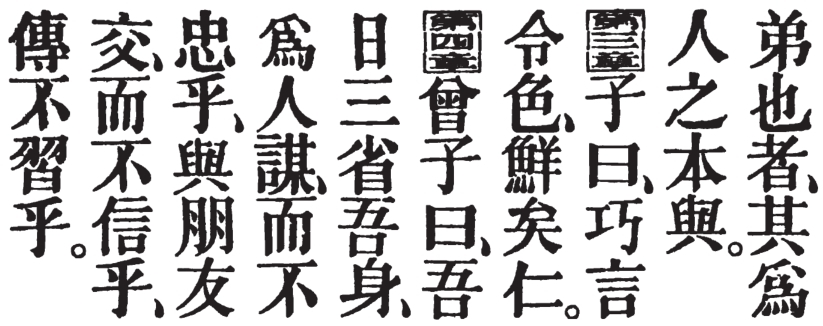
CHAPTER 3
Filial piety and fraternal submission!-are they not the root of all benevolent actions?"
The Master said, "Fine words and an insinuating appearance are seldom associated with true virtue."
CHAPTER 4
The philosopher Tsa ̆ ng said, "I daily examine myself on three points: — whether, in transacting business for others, I may have been not faithful; — whether, in intercourse with friends, I may have been not sincere;-whether I may have not mastered and practiced the instructions of my teacher."

3. FAIR APPEARANCE ARE SUSPICIOUS. 巧言令色 , — see Shoo-king, II. ⅲ .2. 巧 , 'skill in workmanship'; then, 'skill', 'cleverness', generally, and sometimes with a bad meaning, as here,='artful', 'hypocritical'. 令 'a law', 'an order', also 'good', and here like 巧 , with a bad meaning,='pretending to be good'. 色 , 'the manifestation of the feelings in the colour of the countenance', is here used for the appearance generally.
4. HOW THE PHILOSOPHER TSANG DAILY EXAMINED HIMSELF, TO GUARD AGAINST HIS BEING GUILTY OF ANY IMPOSITION. Tsa ̆ ng, whose name was 参 , (Ts'an, now commonly read Sin) and his designation 子舆 , was one of the principal disciples of Confucius. A follower of the sage from his 16 th year, though inferior in natural ability to some others, by his filial piety and other moral qualities, he entirely won the Master's esteem, and by persevering attention mastered his doctrines. Confucius employed him in the composition of the 孝经 , or 'Classic of Filial Piety'. The authorship of the 大学 , 'The Great Learning', is also ascribed to him, though incorrectly, as we shall see. Ten books, moreover, of his composition are preserved in the Le-ke. His spirit tablet among the sage's four assessors, occupying the first place on the west, has precedence of that of Mencius. 省 , read sing, 'to examine'. 三省 is naturally understood of 'three times', but the context and consent of commentators make us assent to the interpretation — 'on three points'. 身 , 'the body', 'one's personality'; 吾身 =myself. 为 is in low 8d tone,= 'for'. So, frequently, below. 忠 from 中 , 'middle', 'the centre', and 心 , 'the heart', =loyalty, faithfulness, action with and from the heart. 朋 , see ch.1. 友 , 'two hand joined', denoting union. 朋友 , 'friends'. 传不习 is very enigmatical. The translation follows Choo He. 何安 explained quite differently: — 'whether I have given instruction in what I had not studied and practiced?' It does seem more correct to take 传 actively, 'to give instruction', rather than passively, 'to receive instruction'. See 四书改错 , XV.17.

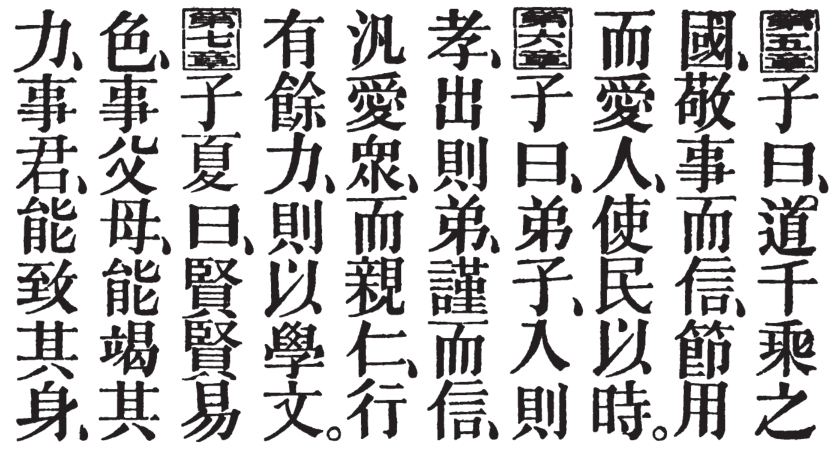
CHAPTER 5
The Master said, "To rule a country of a thousand chariots, there must be reverent attention to business, and sincerity; economy in expenditure, and love for men; and the employment of the people at the proper seasons."
CHAPTER 6
The Master said, "A youth, when at home, should be filial, and, abroad, respectful to his elders. He should be earnest and truthful. He should overflow in love to all, and cultivate the friendship of the good. When he has time and opportunity, after the performance of these things, he should employ them in polite studies."
CHAPTER 7
Tsze-hea said, "If a man withdraws his mind from the love of beauty, and applies it as sincerely to the love of the virtuous; if, in serving his parents, he can exert his utmost

5. FOUNDAMENTAL PRINCIPLES FOR THE GOVERNMENT OF A LARGE STATE. 道 is used for 导 , 'to rule', 'to lead', and is marked in the 3d tone, to distinguish it from 道 , the noun, which was anciently read with the 2d tone. It is different from 治 , which refers to the actual business of government, while 导 is the duty and purpose thereof, apprehended by the prince. The standpoint of the principles is the prince's mind. 乘 , in low 3d tone, 'a chariot', different from its meaning in the 1 st tone, 'to ride'. A country of 1000 chariots is one of the largest flefs of the empire, which could bring such an armament into the field. The last principle, —使民以时 , means that the people should not be called from their husbandry at improper seasons, to do service on military expeditions and public works.
6. RULES FOR THE TRAINING OF THE YOUNG: — DUTY FIRST AND THEN ACCOMPLISHMENTS. 弟子 , 'young brothers and sons', taken together, =youths, a youth. The 2d 弟 is for 悌 , as in ch.2. 入出 , 'coming in, going out',=at home, abroad. 泛 is explained by Choo He by 广 , 'wide', 'widely'; its proper meaning is 'the rush or overflow of water'. 力 , 'strength', here embracing the idea of leisure. 学文 not literary studies merely, but all the accomplishments of a gentleman also: — ceremonies, music, archery, horsemanship, writing, and numbers.
7. TSZE-HEA'S VIEWS OF THE SUBSTANCE OF LEARNING. Tsze-hea was the designation of 卜商 , another of the sage's distinguished disciples, and now place 5 th in the eastern range of 'the wise ones'. He was greatly famed for his learning, and his views on the She-king and the Ch'un Ts'ew are said to be preserved in the comm. of 毛 , and of 公羊高 and 谷梁赤 . He kept himself blind on the death of his son, but lived to a great age, and was much esteemed by the people and princes of the time. With regard to the scope of this chapter, there is some truth in what the comm. Woo, 吴 , says, — that Tsze-hea's words may be wrested to depreciate learning, while those of the Master in the prec. ch. hit exactly the due medium. The 2d 贤 is a concrete noun. Written in full, 贤 , it is composed of the characters for a minister, loyal, and a precious shell. It conveys the ideas of talents and worth in the concrete, but it is not easy to render it uniformly by any one term of another language. The 1 st 贤 is a verb, = 'to treat as a he ̈ en'. 色 has a diff. meaning from that in the 3d ch. Here it means 'sensual pleasure'. Literally rendered, the first sentence would be, 'esteeming properly the virtuous, and changing the love of woman', and great fault is found by some, as in 四书改错 , XIII.1, with Choo He's interpretation which I have followed; but there is force in what his adherents say, that the passage is not to be understood as if the individual spoken of had ever been given to pleasure, but simply signifies the sincerity of his love for the virtuous. 致 here = 委 , 'to give to', 'to devote to'.

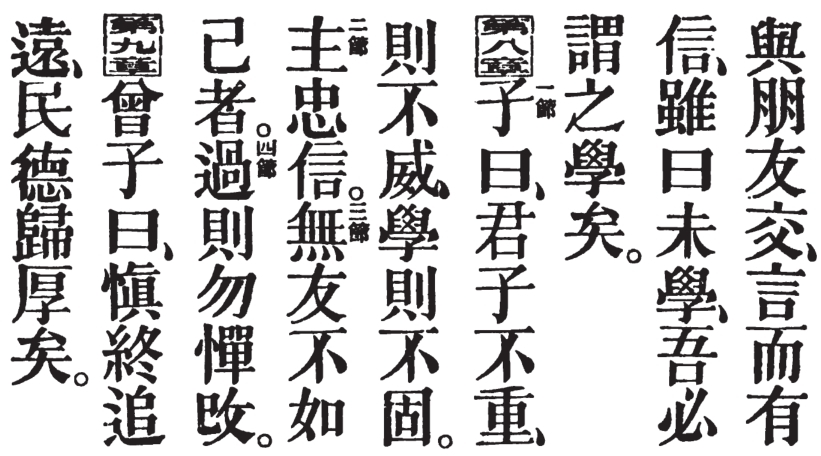
strength; if, in serving his prince, he can devote his life; if, in his intercourse with his friends, his words are sincere: — although men say that he has not learned, I will certainly say that he has."
CHAPTER 8
1. The Master said, "If the scholar be not grave, he will not call forth any veneration, and his learning will not be solid.
2. "Hold faithfulness and sincerity as first principles.
3. "Have no friends not equal to yourself.
4. "When you have faults, do not fear to abandon them."
CHAPTER 9
The philosopher Tsa ̆ ng said, "Let there be a careful attention to perform the funeral rites to parents, and let them be followed when long gone with the ceremonies of sacrifice; — then the virtue of the people will resume its proper excellence."

8. PRINCIPLES OF SELF-CULTIVATION. 1. 君子 has here its lightest meaning,=a student, one who wishes to be a keun-tsze. 孔安国 , of the Han dynasty, in the 1 st half of the 2d century, took 固 , in the sense of 'obscured', 'dulled', and interprets — 'let him learn, and he will not fall into error'. The received interpretation, as in the transL, is better. 2. 主 , as a verb, 'to hold to be chief'. It is often used thus. 3. The object of friendship, with Chinese moralists, is to improve one's knowledge and virtue; — hence, this seemingly selfish maxim.
9. THE GOOD EFFECT OF ATTENTION OF THE PART OF PRINCES TO THE OFFICES TO THE DEAD: — AN ADMONITION OF TSANG SIN. 终 , 'the end',=death, and 远 , 'distant' have both the force of adjectives,= 'the dead' and 'the departed' or 'the long gone'. 慎 and 追 mean, 'to be careful of', 'to follow', but their application is as in the translation. 厚 , 'thick', in opposition to 薄 , 'thin', metasphorically,=good, excellent. The force of 归 , 'to return', is to shew that this virtue is naturally proper to the people.

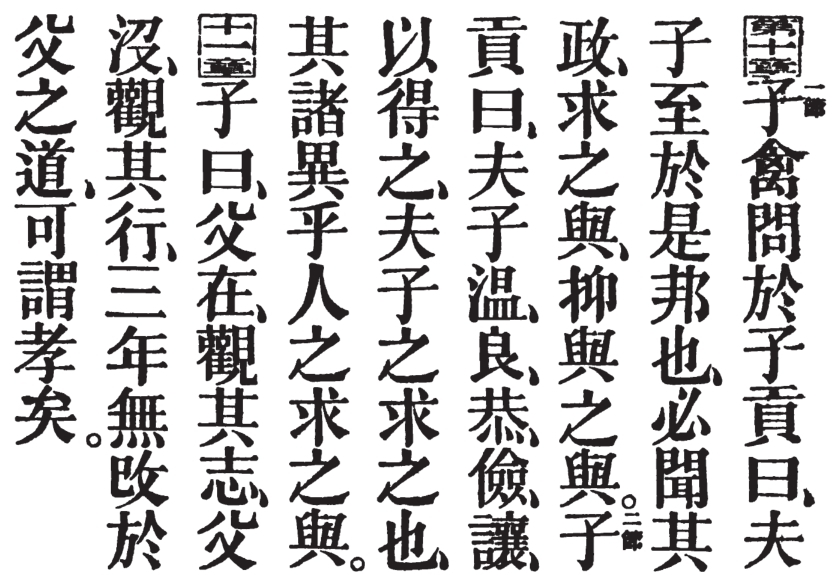
CHAPTER 10
1. Tsze-k'in asked Tsze-kung, saying, "When our master comes to any country, he does not fail to learn all about its government. Does he ask his information? Or is it given to him?"
2. Tsze-kung said, "Our master is benign, upright, courteous, temperate, and complaisant, and thus he gets his information. The Master's mode of asking information!-is it not different from that of other men?"
CHAPTER 11
The Master said, "While a man's father is alive, look at the bent of his will; when his father is dead, look at his conduct. If for three years he does not alter from the way of his father, he may be called filial."

10. CHARACTERISTICS OF CONFUCIUS, AND THEIR INFLUENCE OF THE PRINCES OF THE TIME. 1. Tsze-k'in, and Teze-k'ang ( 亢 ), are designations of 陈亢 , one of the minor disciples of Confucius. His tablet occupies the 28 th place, on the west, in the outer hall of the temples. A good story is related of him. On the death of his brother, his wife and major-domo wished to bury some living persons with him, to serve him in the regions below. The thing being referred to Tsze-k'in, he proposed that the wife and steward should themselves submit to the immolation, which made them stop the matter. Tszekung, with the double surname 端木 , and named 赐 , occupies a higher place in the Confucian ranks, and is now the third on the east, among 'the wise ones'. He is conspicuous in this work for his readiness and smartness in reply, and displayed on several occasions practical and political ability. 夫 , 'a general designation for males',= a man. 夫子 , — a common designation for a teacher or master. 是邦 , 'this country'= any country. 必 , 'must',= does not fail to. The antecedent to both the 之 is the whole clause 闻其政 . Obs. the diff. in 与 , up.2d tone,= 'to give', and often a preposition, 'with', 'to' and 与 , low.1 st tone, as in ch.2. 2. The force of 其诸 is well enough expressed by the dash in English, the previous 也 indicating a pause in the discourse, which the 其 , 'it' resumes.
11. ON FILIAL DUTY. 行 is in the low.3d tone, explained by 行迹 , 'trace of walking',= conduct. It is to be understood that the way of the father had not been very bad. An old interpretation, that the three years are to be understood of the three years of mourning for the father, is now rightly rejected.

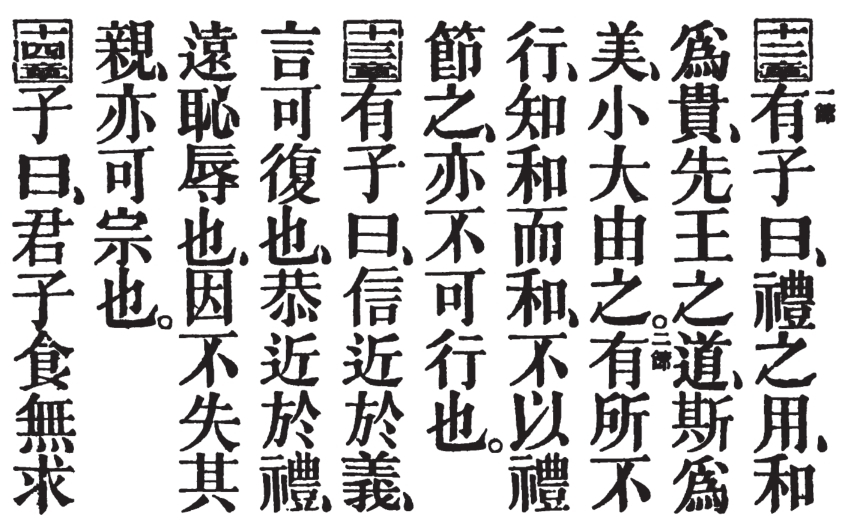
CHAPTER 12
1. The philosopher Yew said, "In practicing the rules of propriety, a natural ease is to be prized. In the ways prescribed by the ancient kings, this is the excellent quality, and in things small and great we follow them.
2. "Yet it is not to be observed in all cases. If one, knowing how such ease should be prized, manifests it, without regulating it by the rules of propriety, this likewise is not to be done."
CHAPTER 13
The philosopher Yew said, "When agreements are made according to what is right, what is spoken can be made good. When respect is shown according to what is proper, one keeps far from shame and disgrace. When the parties upon whom a man leans are proper persons to be intimate with, he can make them his guides and masters."
CHAPTER 14
The Master said, "He who aims to be a man of complete virtue, in his food does not seek to gratify his appetite,

12. IN CEREMONIES A NATURAL EASE IS TO BE PRIZED, AND YET TO BE SUBORDINATE TO THE END OF CEREMONIES, — THE REVERENTIAL OBSERVANCE OF PROPRIETY. 1. 礼 is not easily rendered in another language. There underlies it the idea of what is proper. It is 事之宜 , 'the fitness of things', what reason calls for in the performance of duties towards superior beings, and between man and man. Our team 'ceremonies' comes near its meaning here. 道 is here a name for 礼 , as indicating the courses or ways to be pursued by men. In 小大由之 , the antecedent to 之 is not 和 , but 礼 or 道 . 2. Obs. the force of the 亦 , 'also', in the last clause, and how it affirms the general principle enunciated in the first paragraph.
13. TO SAVE PROM FUTURE REPENRANCE, WE MUST BE CAREFUL IN OUR FIRST STEPS. A diff. view of the scope of this ch. is taken by Ho An. It illustrates, according to him, the difference between being sincere and righteousness, between being respectful and propriety, and how a man's conduct may be venerated. The later view commends itself, the only difficulty being with 近于 , 'near to', which we must accept as a meiosis fro 合乎 , 'agreeing with'. 约 = 信约 , 'a covenant', 'agreement'. 远 , up. 3d tone, 'to keep away from'. The force of the 亦 = 'he can go on to make them his masters', 宗 being taken as an active verb.

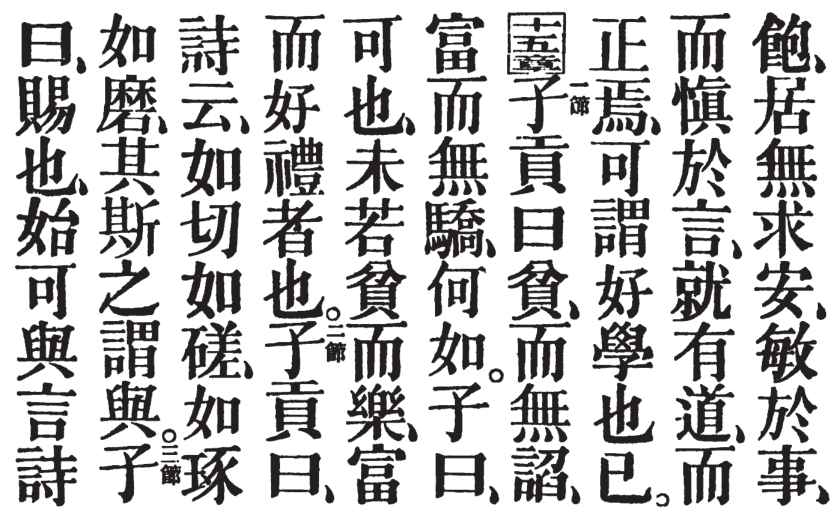
nor in his dwelling-place does he seek the appliances of ease; he is earnest in what he is doing, and careful in his speech; he frequents the company of men of principle that he may be rectified:-such a person may be said indeed to love to learn."
CHAPTER 15
1. Tsze-kung said, "What do you pronounce concerning the poor man who yet does not flatter, and the rich man who is not proud?" The Master replied, "They will do; but they are not equal to him, who, though poor, is yet cheerful, and to him, who, though rich, loves the rules of propriety."
2. Tsze-kung replied, "It is said in the Book of Poetry, 'As you cut and then file, as you carve and then polish.' — The meaning is the same, I apprehend, as that which you have just expressed."
3. The Master said, "With one like Tsze, I can begin to talk about the Odes. I told him one point, and he knew its proper sequence."

14. WITH WHAT MIND ONE AIMING TO BE A KEUN-TSZE PURSUES HIS LEARNING. He may be well, even luxuriously, fed and lodged, but, with his higher aim, there things are not his seeking, —无求 . A nominative to 可谓 must be supposed, — all this, or such a person. The closing particles, 也已 , give emphasis to the preceding sentence,=yes indeed.
15. AN ILLUSTRATION OF THE SUCCESSIVE STEPS IN SELF-CULTIVATION. 1. Tsze-kung had been poor, and then did not cringe. He became rich, and was not proud. He asked Confucius about the style of char. to which he had attained. Conf. allowed its worth, but sent him to higher attainments. 而 , here,= 'and yet'. 何如 , 'what as?'= 'what do you say – what is to be thought, – of this? ' Obs. the force of the 未 , 'not yet'. 2. The ode quoted is the first of the songs of Wei ( 卫 ), praising the prince Woo, who had dealt with himself as an ivory-worker who first cuts the bone, and then files its smooth, or a lapidary whose hammer and chisel are followed by all the appliances for smoothing and polishing. See the Sheking, I. v. Ode I. st. 2. In 其斯之谓 , the antecedent to 其 is the passage of the ode, and that to 斯 is the reply of Confucius. 之谓 , see Premare, p.156. 3. Intorcetta and his co-adjutors translate this par. as if 赐 were in the 2d person. But the Chin. comm. put it in the 3d, and correctly. Premare, on the char. 也 , says, 'Fere simper adjungitur nominibus propriis. Sic in libro Lun Yu, Confucius loquens de suis discipulis, Yeou, Keou, Hoei, vel ipsos alloquens, dicit 由也 , 求也 , 回也 .' With the example in III.17, before us, it is not to be denied that the name before 也 is sometimes in the 2d person, but generally it is in the 3d, and the force of the 也 =quoad. 赐也 , quoed Tsze. 已矣 , nearly= 也已 , in ch.14. 已 , the final part. (see Prem.p.185), is thus marked with a tone, to distinguish it from 已 , 'self', as in next ch. The last clause may be given — 'tell him the past, and he knows the future', but the connection determines the meaning as in the translation. 诸 , as in ch.10, is a particle, a mere 语助 , as it is called, 'a helping' or supporting sound.


CHAPTER 16
The Master said, "I will not be afflicted at men's not knowing me; I will be afflicted that I do not know men."

16. PERSONAL ATTAINMENT SHOULD BE OUR CHIEF AIM. Comp.ch.1.p.8. Obs. the transposition in 己知 , which is more elegant than 知己 would be. 己 , 'self', the person depending on the context. We cannot translate 'do not be afflicted' because 不 is not used imperatively, like 勿 . A nominative to 患 has to be assumed, —我 , 'I' or 君子 , 'the superior man'.


